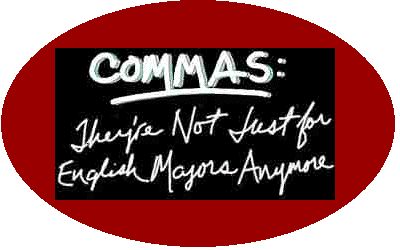
|
commas with... |
Compound (or Coordinate) Adjectives
|
Commas with coordinate adjectives
don't usually pose much of a problem, but they can be tricky. "Coordinate
adjectives" are simply those whose order you could reverse without affecting
the meaning of the sentence. If you CAN reverse the order, use a
comma.
- We eyed
the rotten, wormy tomatoes with delight.
- We eyed
the wormy, rotten tomatoes with delight.
Simple enough. We can justify
the comma between "rotten" and "wormy" because these are compound adjectives.
It gets just a little more complicated in a situation where the adjectives
are built into the noun itself.
The main character
seems brave around hairy, purple spiders, but she faints when she eats the
burnt fried chicken.
This time we can again justify
the commas between "hairy" and "purple" because they're coordinate adjectives.
But notice that we didn't place one between "burnt" and "fried." Why
not? Reversing "burnt" and "fried" would give us the following:
The main
character seems brave around hairy, purple spiders, but she faints when she
eats
the fried burnt chicken.
Ugh. One can imagine fried
chicken burning, but this sentence suggests that the chicken was somehow burnt
before it was fried.
A good
test for whether adjectives are coordinate is to insert and between
them. If the sentence makes sense with the and, you have compound adjectives
and should split them with a comma. Try it:
The flight
attendant nervously passed out cans of tasty, fruit punch before jumping
out of the airplane.
In this
sentence we placed a comma between "tasty" and "fruit." Placing "and" between
"tasty" and "fruit" produces the phrase, "tasty and fruit punch."
Huh? In this case, the term "fruit punch" acts like a single
term--much the way terms like "old geezer" or "fried chicken" usually do.
Remember, ultimately we use commas to make our meaning as clear to the reader
as we can. The comma between "tasty" and "fruit" just makes things confusing.
In this case, therefore, we would take out the comma:
The flight
attendant nervously passed out cans of tasty fruit punch before jumping out
of the airplane.
|
|
|
|
|
|
|
|
|
IE: Introductory Elements
|
|
|
2IC: Two Independent Clauses
|
|
|
CA: Compound or Coordinate Adjectives
|
NRE: Non-Restrictive Elements
|
|
|
|
|
|
|
|
|
|
|
|
|
|
|
|